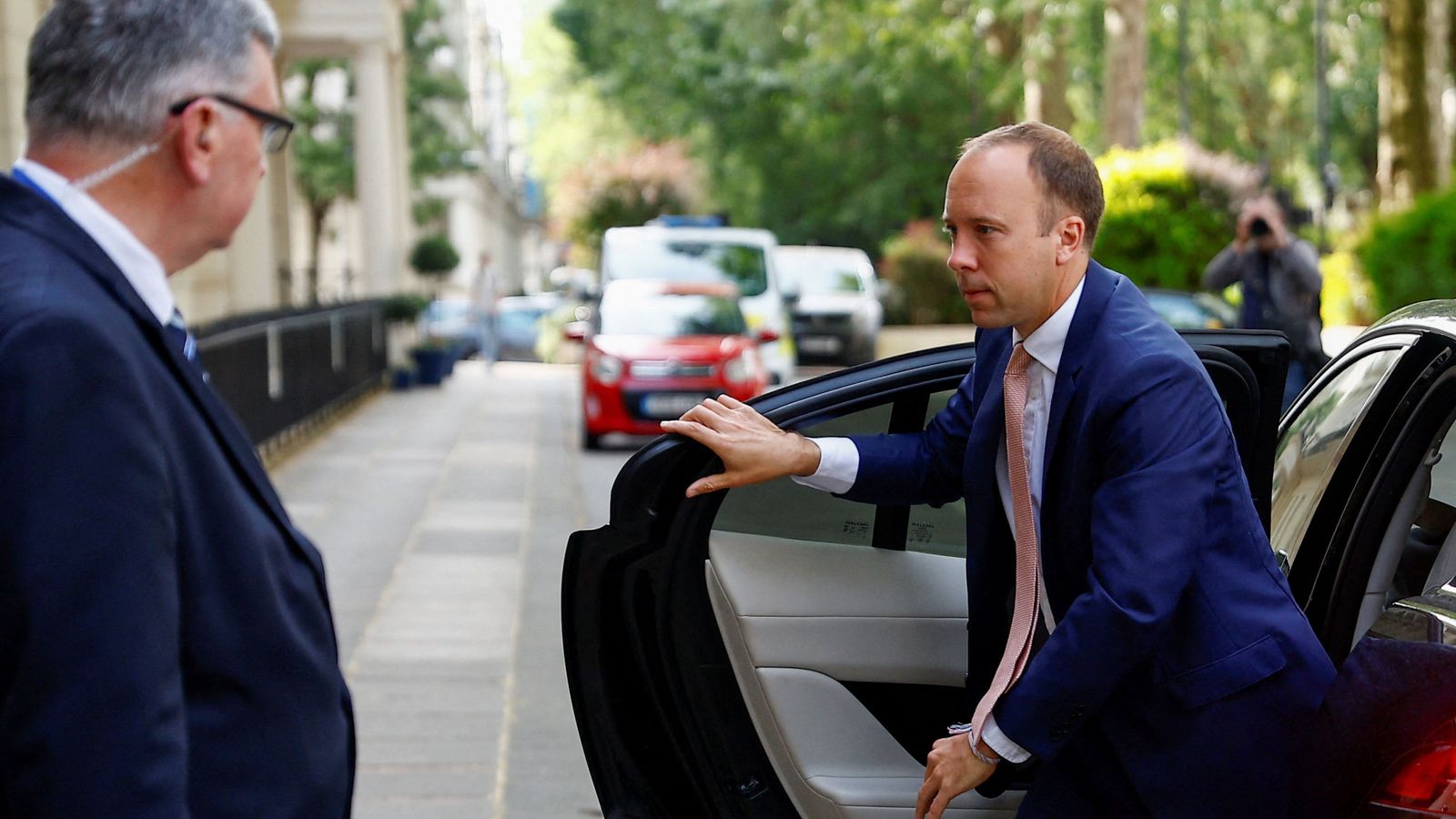Matt Hancock has criticised the UK’s approach to planning for pandemics as “completely wrong”.
The former health secretary told the coronavirus inquiry: “The attitude, the doctrine of the UK was to plan for the consequences of a disaster.
“Can we buy enough body bags? Where are we going to bury the dead?
“And that was completely wrong. Of course, it’s important to have that in case you fail to stop a pandemic, but central to pandemic planning needs to be – how do you stop the disaster from happening in the first place? How do you suppress the virus?”
COVID inquiry latest: Widow cries as Matt Hancock arrives to give evidence to COVID Inquiry
Mr Hancock said he is “profoundly sorry” for every death caused by COVID-19 and blamed “doctrine” for believing the UK had things under control.
He said doctrinal failures had “consequences” in areas such as “stockpiles, testing, antivirals, contact tracing, and much more widely” when the pandemic struck in 2020.
Matt Hancock to appear before COVID inquiry
COVID inquiry: Austerity measures hit public health services, Professor Dame Jenny Harries says
Watch live: Chancellor Jeremy Hunt gives evidence to COVID inquiry
He added that having pandemic plans focusing on flu was not the central flaw.
“For instance, large-scale testing did not exist and large-scale contact tracing did not exist because it was assumed that as soon as there was community transmission, it wouldn’t be possible to stop the spread, and therefore, what’s the point in contact tracing?” he said.
“That was completely wrong.”
Read more from Sky News:
Austerity measures hit public health services, Professor Dame Jenny Harries says
What we learned from the first week of the COVID inquiry
Systems to stop next pandemic ‘being dismantled as we speak’
Mr Hancock also said he was concerned the systems to stop the next pandemic are “being dismantled as we speak”.
Speaking about the lack of proper preparedness, he said: “I am profoundly sorry for the impact that it had, I’m profoundly sorry for each death that has occurred.”
He added: “And all I can do is ensure that this inquiry gets to the bottom of it, and that for the future, we learn the right lessons, so that we stop a pandemic in its tracks much, much earlier.
“And that we have the systems in place ready to do that, because I’m worried that they’re being dismantled as we speak.”
Health correspondent
Matt Hancock’s line of defence, one he repeated over and over during a sometimes tetchy exchange with Hugo Keith KC, was that he inherited a health system that would not be able to cope with a non-influenza pandemic.
The former health secretary told the COVID inquiry he came to the conclusion “doctrinal” issues prevented the country’s preparedness.
Instead the system was geared towards dealing with “mass casualties” and the consequences of a global health emergency.
The inquiry’s lead counsel asked again and again why he, as secretary of state, did nothing to address this obvious failure. There was no straight answer from Mr Hancock.
And this was a recurring theme throughout his three hours on the witness stand.
Mr Hancock said he saw potential problems but could not do anything to change “a flawed system”. This refusal to accept any responsibility was perhaps most evident when addressing adult social care.
The decision to move untested elderly patients from hospitals into care homes had catastrophic consequences. It is one of the single biggest scandals of the pandemic. But Mr Hancock said despite having the sector’s name in his job title he had no power over adult social care as it came under the jurisdiction of local authorities.
Again, the same defence: flawed systems that hampered his pandemic efforts. The inquiry was warned right at the beginning of this morning’s session Mr Hancock’s evidence would be limited to the years before the actual pandemic as this Module 1 deals exclusively with preparedness and resilience.
But Mr Hancock clearly wanted everyone to know that despite taking on a system that was not ready, among other things, to scale-up mass testing and vaccine roll out, it was because of his personal interventions that significant gains were made to combat the spread of the virus. He said he went against WHO advice to impose the first quarantines on international travellers who might have been exposed to the virus.
This will not sit well with the bereaved families who sat in the same room listening to his evidence. And Mr Hancock knows this. He said he was “profoundly sorry for each death” but admitted he also understood “why this apology would be hard to take from someone like him”.
By taking no responsibility and continually blaming a system for which he was singularly responsible as health secretary, Mr Hancock has done nothing to make his apologies to bereaved families any easier to accept.
UK system ‘geared towards how to clear up after a disaster, not prevent it’
Under questioning from Hugo Keith KC, lead counsel to the inquiry, Mr Hancock listed the issues the UK faced with PPE (personal protective equipment), tests, antivirals and vaccine preparedness.
The MP said he was told the UK was one of the best-placed countries in the world at responding to a pandemic – which “turned out to be wrong”.
He told the inquiry the system was “geared towards how to clear up after a disaster, not prevent it” and that “flaw, that failure, went back years and years and was embedded in the entire system response”.
Please use Chrome browser for a more accessible video player
Mr Hancock became one of the most recognised politicians in the country as he worked to steer the UK’s coronavirus response before he was forced to quit in June 2021 after footage emerged of him embracing his aide Gina Coladangelo while social distancing guidelines were still in place.
Mr Hancock gave evidence a day after the head of the UK’s Health Security Agency said austerity measures left public health services “denuded”.





